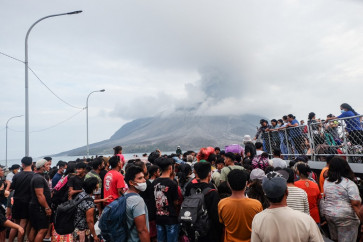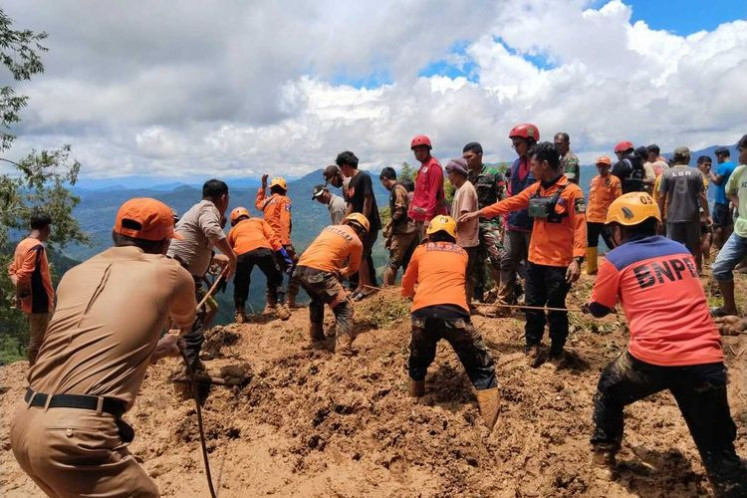From Indramayu to Saudi Arabia: The journey of hope
The Singapore Airlines stewardess was extremely polite as she asked the young Indonesian girl to sit up correctly
Change Size

T
he Singapore Airlines stewardess was extremely polite as she asked the young Indonesian girl to sit up correctly. The girl, an Indonesian migrant worker (TKI), was on her way back from Saudi Arabia to Jakarta on leave.
Slouched in her seat, she had her headphones on and was humming away to dangdut tunes, while her toes protruded out and touched the arm of the man sitting in front of her.
The girl did not speak English, so the stewardess had to point to the girl's feet. A group of her friends was sitting at the back of the plane, and one of them yelled out in Indonesian: 'For heaven's sake, your feet!!!'
The girl was in her early 20s and came from Indramayu. Her first major trip from Indramayu was to Saudi Arabia, not Jakarta. She explained that she had seen enough of Jakarta traveling in on the bus from Indramayu, and assured me that Jeddah was far more modern than Jakarta.
In the middle of our conversation, she asked me to help her fill in the Indonesian customs declaration. When it turned out that she could barely write, she casually said that she had not completed primary school education.
As I was filling in her customs declaration form, she suddenly said to me: 'You know, the Revlon lipsticks in Riyadh are much cheaper than in Indonesia and the colors are much nicer; there is a great range!' This was an indication that in her opinion, my lipstick color was inappropriate.
The leapfrog from a poor village in rural Indramayu, a bus ride from the local bus station to Jakarta's international airport, and then a plane ride to Saudi Arabia, in search of a job with no language capabilities and no knowledge of where she was heading, except that the holy city of Mecca was located in the country, reveal the actions of a person desperate to break out of the cycle of poverty in her place of origin.
This is globalization in the extreme, linking local networks of people directly to the international arena and bypassing the national level. How does this shape the communities at the local level? What are the impacts?
This young girl is one of 6.5 million Indonesians currently working overseas in 142 countries. Most spectacular is their contribution to the Indonesian economy, as it rivals the role of other economic activities.
The International Labor Organization (ILO) in Indonesia has stated that these TKIs contribute US$7 billion annually to Indonesia's foreign exchange income. Compare this with the exports of the Indonesian shoe industry, which in 2012 amounted to US$3.9 billion.
I asked: 'Why did you leave Indramayu?' The girl explained that her father worked as an agricultural laborer and, assuming there had been enough rain, he earned Rp 1 million ($100) a month; whereas in Saudi Arabia, she received Rp 3.5 million a month.
She went on to say: 'I have no expenses, as food and lodgings are provided. My father has to take his own lunch to the fields!' She probably said to her parents before leaving: 'I am tired of being poor; it's no fun!' She said she would stop working as a TKI once she owned a house of her own and had saved up enough money to open a small shop.
Saudi Arabia is the number-one destination for our migrant workers, with more than 1.5 million TKIs working there. Indramayu is the largest source of TKIs in Indonesia and 80 percent of these TKIs are women.
The Indramayu area is also one of the largest suppliers of prostitutes in Indonesia. A Jakarta-based NGO that works with women found that two major factors led to prostitution: poverty and a low level of education. In the 1970s, the Indonesian government improved irrigation in Indramayu, making it one of the most agriculturally productive areas in Java.
Rich outsiders, however, began moving in and buying up the land, thus creating a class of small landowners who controlled most of the land and agricultural produce. As the locals in Indramayu became farm laborers, poverty started to kick in and become cyclical.
Despite the fact that the Indramayu regent is a woman, there has not been much change.
The current regent is the wife of the former regent, who headed the Indramayu administration from 2000 to 2010.
The freedom that our women TKIs enjoy in Indonesia does not apply in Saudi Arabia, where the kingship system of government is deeply entrenched. The 'guardianship system', together with strict gender segregation, severely limits women's opportunities to take part in public life.
A woman, regardless of her age or marital status, is required to have a male guardian. A woman cannot travel, attend university, work or marry without her guardian's permission.
There is, however, an even darker side to the Indramayu'Saudi Arabia relationship. An Indonesian maid, Ruyati binti Sapubi, was beheaded in June 2011 after being convicted of murdering her Saudi employer because he denied her permission to return to her family in Bekasi.
In another case, Sumiati binti Salan Mustapa was hospitalized in Medina in November 2010, after her employer had cut off her lips with scissors, burnt her back with an iron, smashed her legs with beatings and broke one of her fingers.
Not long afterward, the body of Kikim Komalasari from Cianjur was found, dumped in a garbage bin in the city of Apha in 2011; her neck had been slashed and she had severe cuts to the rest of her body.
The plane landed in Jakarta and the girl from Indramayu joined the flock of TKIs waiting outside the plane. The group prepared to face the next challenge of immigration procedures before getting on the bus to take them home to their families.
As they walked away together, the men at the airport taunted and whistled at them. The women took no notice and continued walking. As the girl turned and looked at me, I muttered under my breath, 'Go sisters, go. Take on the world!'
The writer, a former journalist, is secretary-general of the Indonesian Community for Democracy (KID).









